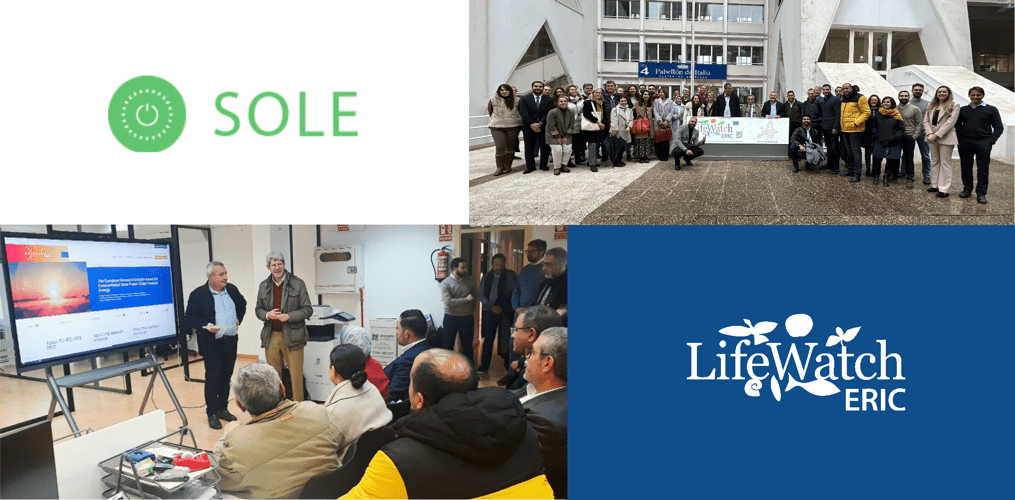
Last week, the LifeWatch ERIC ICT-Core & FEDERTech office, located in the Cartuja Science and Technology Park in Seville, hosted partners from seven Mediterranean countries composing the backbone of the SOLE Project. It focuses on energy efficiency in public buildings, framed within the ENI CBC MED programme, and involves regional corporations, municipalities, public agencies and research centres from Italy, Egypt, Greece, Tunisia, Jordan, Spain and Lebanon. The ICT-Core & FEDERTech technological and project management team held an extensive working meeting with the 17 SOLE delegates, exploring how to model future collaborations to better face the challenges of climate change.
SOLE, “High Energy Efficiency for the public stock buildings in Mediterranean”, aims to develop joint strategies that support profitable and innovative energy rehabilitation of public buildings. The energy situation in the building sector in Mediterranean countries is critical due to the age of most buildings. A lack of renovations over time has led to high energy use in both summer and winter, increasing annual energy consumption and CO2 emissions. On a more positive note, the Mediterranean region is characterised by similar construction methods, and what’s more, thanks to its geographical position, there is a strong potential in the use of renewable energy sources.
In SOLE, the cross-border exchange of know-how will inform the Pilot Actions in selected public buildings. As explained by the coordinator of the SOLE Project, Valentina Bucchi from ANCI Toscana, and meeting coordinator Joaquín Villar from the Andalusian Energy Agency, the SOLE pilot projects are: a public nursery in Italy; the laboratories of the School of Architecture in Athens (Greece); the headquarters of the Andalusian Energy Agency in Seville; the Faculty of Engineering of Alexandria University (Egypt); a public school in Jordan; the headquarters of the municipality of Mnihla in Tunisia, and a public sports complex in Lebanon.
LifeWatch ERIC CTO, Juan Miguel González-Aranda, and LifeWatch ERIC Artificial Intelligence researcher, Rohaifa Khaldi, explained cooperation initiatives in e-biodiversity that LifeWatch ERIC is already promoting in the Mediterranean, such as support for the Arab States Research and Education Network (ASREN) in the preservation of Arab ecosystems. They also spoke about potential synergies, such as in relation to concentrated solar power generation, a technology developed by EU-Solaris ERIC.
SOLE members: Associazione Nazionale Comuni Italiani Toscana – ANCI Toscana (Italy), Agenzia Regionale Recupero Risorse (Italy), National Technical University of Athens (Greece), Federation of Egyptian Chambers of Commerce – Alexandria Chamber (Egypt), Confederation of Egyptian European Business Associations (Egypt), Royal Scientific Society/National Energy Research Centre (Jordan), Municipality of Jounieh (Lebanon), Andalusian Energy Agency (Spain), Fédération Nationale des Villes Tunisiennes (Tunisia) and Municipalité de Mnihla (Tunisia).